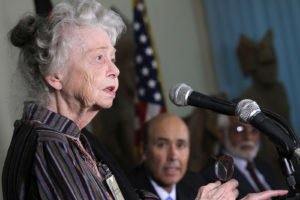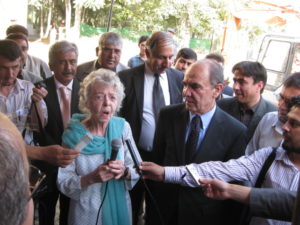On September 10, 2017, Afghanistan said goodbye to one of its fiercest and most loyal international champions, Nancy Hatch Dupree, who died in Kabul at the age of 89. The American historian, educator, and writer spent more than half her life working to preserve Afghanistan’s rich cultural heritage. Her dedication to showcasing the country’s history and culture on the world stage eventually earned her the nickname of “Grandmother of Afghanistan” from many Afghans.
In celebration and in memory of Dupree’s remarkable legacy and her contributions to Afghanistan, read on for an overview of her incredible life and work.
An unusual upbringing

Nancy Hatch Dupree | US Embassy Kabul | Flickr
By the time Nancy Hatch Dupree first arrived in Afghanistan in 1962, she had already lived a very unconventional life for a woman of her time and circumstances. Born in 1927 in Cooperstown, New York, Dupree grew up in India in what is now the state of Kerala. Both her parents were closely involved with Indian culture: her father was one of the earliest pioneers of rural development programs, and her mother was a student of Indian theater and dance.
She later attended high school in Mexico, where her father was helping to open UNESCO, and pursued studies in Chinese history at Columbia University—her first experience of living for any length of time in a modern American city. At Columbia, Dupree met her first husband, a member of the US Foreign Service. It was through one of his diplomatic postings that Dupree arrived in Kabul in 1962 and quickly became captivated with the country and its culture.
An impressive body of work
Nancy Hatch Dupree is the author of five books and over 100 articles about Afghanistan, making her one of the world’s most prolific and respected authors on the subject. Her writing on Afghanistan began during her early days in the country. Having visited the Buddhas at Bamiyan (a remarkable historic site destroyed in 2001), she was frustrated at not being able to find detailed information about the monuments. To rectify this, she became determined to write a guidebook herself, and it was in the course of researching her first work that she met Louis Dupree, the leading archaeological authority in Afghanistan. He would later become her second husband and lifelong collaborator.
In the following years, while accompanying Louis Dupree on his work around Afghanistan, Nancy Hatch Dupree continued to write guidebooks, which are today recognized as witty and iconic works capturing a pivotal moment in Afghanistan’s history. One of these books became the inspiration for Homebody/Kabul, an ambitious play by Pulitzer Prize-winning playwright Tony Kushner that has served as the first introduction to Afghan history and culture for many Western theatergoers.
A passion for preservation

Nancy Hatch Dupree | Estonian Foreign Ministry | Flickr
The communist coup of the late 1970s put an end to the Duprees’ time in Afghanistan; they were deported from the country and spent the following years in exile until Louis Dupree’s death from cancer in 1989. Determined to continue the groundbreaking preservation efforts he had championed, Nancy Hatch Dupree became more committed than ever to conserving Afghanistan’s cultural legacy in the face of destructive civil conflict.
In the 1990s, when war threatened Kabul, she was part of a small group that leapt into action to prevent the looting and destruction of some of the most important artifacts in the National Museum of Afghanistan, including its priceless gold collection. Dupree helped find secret hiding places for these artifacts (including the vault of Afghanistan’s central bank), and continued to travel back and forth to Kabul from outside Afghanistan even during periods of extreme instability. Thanks to these efforts, many important cultural artifacts were saved from being lost forever. They now help provide a vital link between Afghanistan’s past and future.
An enduring legacy
In addition to the work and contributions described above, perhaps the most enduring part of Nancy Hatch Dupree’s legacy is the Afghanistan Center at Kabul University (ACKU). The world’s largest working archive of material on Afghan history and society, ACKU has a collection of more than 100,000 items that were gathered by Dupree over the course of her many years of working to preserve Afghan culture.
While Dupree initially assembled much of the material while living outside Afghanistan, she was able to return to Kabul with her collection in the early 2000s and make plans for its future. Dupree saw her treasure trove of books, newspapers, magazines, photos, and documents as a vital tool that could assist in Afghanistan’s reconstruction and serve as a resource for understanding the past, in order to prevent future violence and instability. Consequently, one of her most pressing goals was to find a permanent home for the archive. To achieve this goal, she founded the Society for the Preservation of Afghanistan’s Cultural Heritage, which eventually helped create the purpose-built ACKU. Today, the Center stands as a vital hub of ideas and knowledge for Afghan and international scholars alike.

